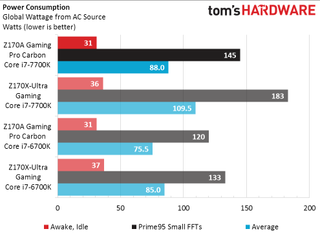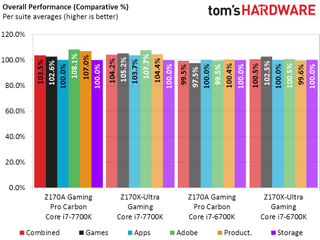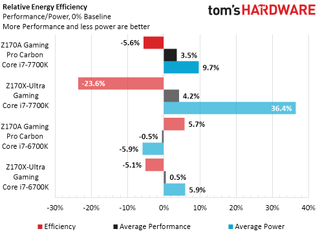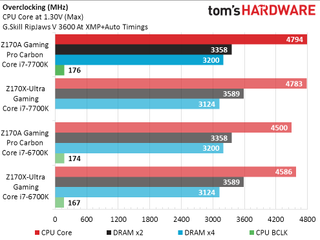Intel Core i7-7700K Retest: More Overclocking, Less Heat
Our saga to find the best Z170 motherboard for Kaby Lake continues, as we grow impatient for Z270 replacements.
The greatest takeaway from our initial Core i7-7700K overclocking test was that at high operating frequencies, Kaby Lake processors behave much like the Skylake models they replace. Adding voltage adds more stability for overclocking, with a corresponding heat penalty. After pushing our platform beyond 180W at full CPU load and stock clocks, and then noticing that peak power dropped by over 40W under abnormal firmware behavior, I postulated that a truly stable firmware would put actual energy consumption numbers between those highs and lows. A public firmware update for MSI’s Z170A Gaming Pro Carbon gave me the opportunity to test that hypothesis. Other than the new motherboard, the test configuration remains the same as our previous article.

Locked and loaded on the Z170A Gaming Pro Carbon, Core i7-7700K power numbers begin to fall in line with expectations set forth by Intel, when it added only a few watts TDP compared to the Core i7-6700K. It looks like the Z170X-Ultra Gaming firmware needs a little more work.

Temperatures are a different matter, but rather than blame a poor Core i7-7700K sample for the vast increase, I’m crediting this specific Core i7-6700K for producing lower-than-expected temperatures. Some samples are just a little bit better than others when it comes to moving heat from the CPU core to its integrated heat spreader.
















We already did a benchmark play-by-play in our previous analysis, and not much changes with the different motherboard. Highlights include slightly improved bandwidth for the Z170A Gaming Pro Carbon and lower FPS in The Talos Principle, which we were able to blame on troubles between that title and the motherboard’s included Nahimic Audio software. Disabling that software allows the Z170A Gaming Pro Carbon to perform on par with the previously tested Z170X-Ultra Gaming motherboard, as it gains 21 FPS and 9 FPS at the benchmark’s two respective detail levels.

Using that average of both Core i7-6700K configurations as a baseline, you can see that the Core i7-7700K performs about 8% better in applications that are primarily CPU limited. Adding benchmarks that aren’t limited by the CPU diminishes that advantage.

Even with a better-balanced motherboard, Intel’s big performance boost still looks incredibly like an overclock, and just as incredible is that this isn’t the first time we’ve seen Intel try that. At least the processor is stable this time, even though the better-balanced Z170A Gaming Pro Carbon still loses approximately 11% of its efficiency when going from a Core i7-6700K to a Core i7-7700K at firmware defaults.

It’s a little hard to fault Intel at all for wanting to push a little more out of its revised core, as we found an extra 200MHz of overclocking capability in the Core i7-7700K. And because the Z170A Gaming Pro Carbon’s firmware functioned a little more smoothly than the previously-used model, I was even able to boot it at 5.00GHz, only to find that it wasn’t stable enough to run Prime95 at any frequency above 4.80GHz. And yes, I did try more voltage.
Stay on the Cutting Edge
Join the experts who read Tom's Hardware for the inside track on enthusiast PC tech news — and have for over 25 years. We'll send breaking news and in-depth reviews of CPUs, GPUs, AI, maker hardware and more straight to your inbox.
Other findings include that at 4.80GHz and 1.30V, the MSI-based platform still drew a mere 170W, and the CPU reached only 86°C. That extra thermal headroom is exactly what I needed to play around with more voltage, before finding that 4.80GHz is the best OC setting for this Core i7-7700K sample.
Chasing clock rate always incurs power and thermal penalties. Today’s news is that the penalties seen in our previous Core i7-7700K overclocking article are roughly cut in half simply by using a better-optimized motherboard. That makes this the perfect CPU to buy instead of its predecessor, for those of us who really want the extra performance and overclocking capability.
-
ssdpro I guess someone didn't like the initial findings. Was it the motherboard mfg or Intel themselves? Or both? Blanket statements like "That makes this the perfect CPU to buy..." smell of marketing influence.Reply -
anbello262 Reply18945131 said:I guess someone didn't like the initial findings. Was it the motherboard mfg or Intel themselves? Or both? Blanket statements like "That makes this the perfect CPU to buy..." smell of marketing influence.
It was the community. Have you read the comments on the previous article? A lot of people were saying that this MOBO had known firmware issues, and many asked for a retest.
And that final statement emphasises "instead". Meaning "if you were going to buy Skylake, you should buy KabyLake instead". -
rantoc Thx for the preview, will be more interested to see what the retail ones will be averaging. If the OC potential without exotic cooling averages in retail is good the product may have some added benefits beside the pretty much non-existent other ones.Reply
I hope AMD's Zen will deliver because intel sure as hell isn't going to without a kick in the nuts. -
xFeaRDom I'm ready for people to complain about something this time. :loL:Reply
If it's something that's affecting you so much, go and train, become an engineer/scientist and find something that will allow Moore's law to speed back up instead of decrease again. -
Brian_R170 If a person were in a position to choose either a 6700K or a 7700K, then it's unlikely that they already have a Z170 board, and given that the 6700K and 7700K are priced identically, buyers should really wait and see the performance and price of 200-series boards before deciding which is "the perfect CPU to buy".Reply -
knowom Wow entirely unimpressive congrats Intel you've managed to produce virtually the same CPU how tempting no thanks...I'm feeling a little Zen right now.Reply -
xFeaRDom Reply18945219 said:Wow entirely unimpressive congrats Intel you've managed to produce virtually the same CPU how tempting no thanks...I'm feeling a little Zen right now.
It's not like Intel can improve their CPUs much, only thing is to bring the 6 cores down to the current 4 cores price range, which wont happen.
Just because AMD has a lot of headroom to improve their CPUs, such as much stronger cores etc. Thats why Zen seems to be hyped up so much.
The last few releases of CPUs haven't had much improvement generally, probably 5-10%, maybe a little extra overclocking room, more efficient, it's not going to go from what it currently is to being able to create a supercomputer. -
ComputerSecurityGuy It is looking like the i7-7700K is basically a better binned slightly tweaked i7-6700K.Reply
No shock there. I would like to see a comparison of the i7-6700K@4.2gHz versus the i7-7700K at stock. Same configuration. I want to see, exactly, whether there is any IPC change. -
Nintendork Skylake and KL are the same damn chip (not even a new stepping, remember the C2D or Phenom II with new stepping improvements?), better yields for intel. even the Haswell Refresh decrease a bit of the voltages.Reply -
JamesSneed Reply18945235 said:18945219 said:Wow entirely unimpressive congrats Intel you've managed to produce virtually the same CPU how tempting no thanks...I'm feeling a little Zen right now.
It's not like Intel can improve their CPUs much, only thing is to bring the 6 cores down to the current 4 cores price range, which wont happen.
Just because AMD has a lot of headroom to improve their CPUs, such as much stronger cores etc. Thats why Zen seems to be hyped up so much.
The last few releases of CPUs haven't had much improvement generally, probably 5-10%, maybe a little extra overclocking room, more efficient, it's not going to go from what it currently is to being able to create a supercomputer.
Its pretty obvious Intel shifted to focus on built in GPU performance instead of CPU performance over the last few iterations. They can do this since AMD is so far behind for the last decade. From a consumer perspective this has sucked but I don't blame Intel as they make the same amount of money and don't get deemed a monopoly. I think many are excited for Zen because its the first chance in a long time AMD will be competitive once again and with that we all hope the pace of change moves faster once again.
Most Popular



